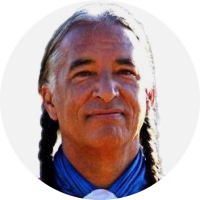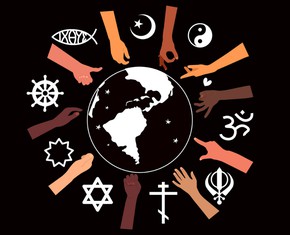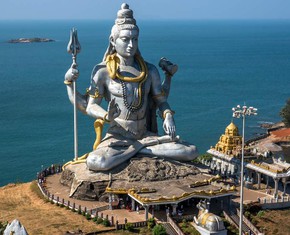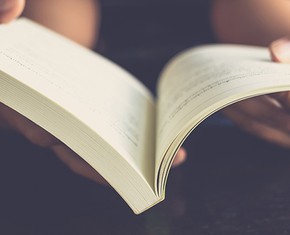The views expressed in our content reflect individual perspectives and do not represent the authoritative views of the Baha'i Faith.
In this installment of our extensive series of BahaiTeachings.org articles on Indigenous messengers of God, Chris Buck and Kevin Locke consult together on why those messengers matter to the modern world.
Q: Kevin, let’s talk a little more about the whole idea of the Indigenous messengers of God, in general, from a Baha’i perspective, and why those messengers are so important to consider. You and I have very clear reasons for creating this “Indigenous Messengers of God” series — a very real and practical purpose, in fact. But first, let’s review the fundamental basis for the series.
Baha’u’llah, as you know, did not mention the Indigenous messengers of God directly. He did so indirectly, in such passages of his writings as this one, a favorite passage of your late mother, Patricia Locke:
Unto the cities of all nations He hath sent His Messengers, Whom He hath commissioned to announce unto men tidings of the Paradise of His good pleasure, and to draw them nigh unto the Haven of abiding security, the Seat of eternal holiness and transcendent glory. – Baha’u’llah, Gleanings from the Writings of Baha’u’llah
Here, Kevin, you and I agree that “the cities of all nations” must refer to all countries around the world, including the Americas – the “First Nations.”
Now please follow my logic here: The following letter from the Universal House of Justice states that Abdu’l-Baha had, in effect, added the Buddha to the Manifestations (Messengers or Prophets) of God not previously mentioned by Baha’u’llah. After quoting this passage below, I will explain the relevance of this interesting point:
Baha’u’llah made no mention of Buddha, and if it had not been for Abdu’l-Baha’s statement we would not have been in a position to state definitely that Buddha had been a Manifestation of God. There are a myriad traditions in the legends of peoples that point back to some sort of divine revelation but, as the beloved Guardian’s secretary pointed out on his behalf in a letter written to an individual believer on 13 March 1950, “… We cannot possibly add names of people we (or anyone else) think might be Lesser Prophets to those found in the Qur’an, the Bible and our own Scriptures. For only these can we consider authentic Books.” We must just accept that there are undoubtedly many prophetic figures of whom all authentic record has been lost. – Letter, dated 27 October 1986, sent on behalf of Universal House of Justice to an individual.
As to those “many prophetic figures of whom all authentic record has been lost,” we know that anything lost may later be found. (We’ll discuss this idea further in a subsequent article.)
This process of adding to — and thereby augmenting and enriching — the list of names of the messengers of God to those previously mentioned by Baha’u’llah gets more interesting, considering that Abdu’l-Baha also added the name of Krishna to those messengers of God whom Baha’is recognize as well. In his Tablet to Amir Khan, Abdu’l-Baha also added the category, or class, of Indigenous messengers of God to the Americas, but without mentioning specific names:
In ancient times the people of America were, through their northern regions, close to Asia, that is, separated from Asia by a strait. For this reason, it hath been said that crossing had occurred. There are other signs which indicate communication.
As to places whose people were not informed of the appearance of Prophets, such people are excused. In the Qur’an it hath been revealed: “We will not chastise them if they had not been sent a Messenger.” (Qur’an 17:15.)
Undoubtedly in those regions the Call of God must have been raised in ancient times, but it hath been forgotten now. – Abdu’l-Baha, Tablet to Amir Khan.
Although we have referred to this passage several times throughout this series, let’s see what the internal evidence, standing alone, suggests, by way of a close reading and textual analysis.
Here, “the people of America” who lived “in ancient times” refers to those who dwelled on the American continents during the pre-contact period prior to Columbus and the subsequent European colonization (to put it politely). The “people of America” who lived “in ancient times” clearly identifies the Indigenous peoples – the original inhabitants of the Americas.
Consequently, the places where the Indigenous people of the Americas lived refers not only to “their northern regions” (i.e. North America), but evidently to all of the Americas as well — that is, to the entire length and breadth of the Western Hemisphere, the so-called “New World.”
Interestingly, Abdu’l-Baha doesn’t fully endorse the Bering Land Bridge theory, but simply mentions it (“it hath been said”) by way of acknowledging a contemporary scientific theory, perfectly in keeping with the Baha’i principle of the harmony of science and religion.
In the final sentence of this brief yet significant tablet, Abdu’l-Baha added the category of Indigenous messengers of God to those already identified in the writings of Baha’u’llah. He also added the Buddha and Krishna, as previously mentioned.
The context makes it clear that the terms “Call of God” and “Messengers of God” are synonymous, because the “Messengers of God” are the ones who originally raise the “Call of God,” as Baha’u’llah states in this exemplary passage:
These sublime words have streamed forth from the Pen of the Most High. He saith, exalted be His glory: “This is the day of vision, for the countenance of God is shining resplendent above the horizon of Manifestation. This is the day of hearing, for the call of God hath been raised. It behoveth everyone in this day to uphold and proclaim that which hath been revealed by Him Who is the Author of all scripture, the Dayspring of revelation, the Fount of knowledge and the Source of divine wisdom.” – Baha’u’llah, The Tabernacle of Unity, p. 21 (emphasis added).
Space does not permit any further elaboration on this point – but suffice it to say that there is plenty of evidence in the Baha’i writings to support this interpretation, which is my personal understanding, and not an “official” position.
That said, that which is “forgotten” may also be remembered. We previously addressed this issue in Part 52 (“Remembering ‘Forgotten’ Indigenous Religions”) of this “Indigenous Messengers of God” series.
Kevin, do you have any further comments to add? Why is this topic important? Why have we spent so many articles in this series addressing it? What do we do with this information? Why is it useful? Why is it needed?
A: Just because a portion of humankind occupying half the planet Earth were ruthlessly slaughtered and disenfranchised of their birthright as human beings does not justify that their spiritual heritage — through which a huge portion of the world’s basic foods, medicines and institutions were divinely inspired — should continue to be ignored.
Now that the world is on a forced time-out in a worldwide lockdown, it is fitting to meditate on the spiritual heritage of half the planet and how it has benefitted us all. Two good references for reflection on this point are by Jack Weatherford, DeWitt Wallace Professor, Emeritus, Macalester College: Indian Givers: How the Indians of the Americas Transformed the World (1988) and Native Roots: How the Indians Enriched America (1991). His findings are summarized in a 1996 article, “Impact of American Indian Civilizations on Europe and the World,” in The Encyclopedia of the American Indian. What Professor Weatherford omits is that the Indigenous people themselves attribute their contributions to America and to world civilization to those “Wise Ones” commissioned by the “Great Spirit” to raise the “Call of God” throughout the Western Hemisphere.

















Comments
Sign in or create an account
Continue with Googleor